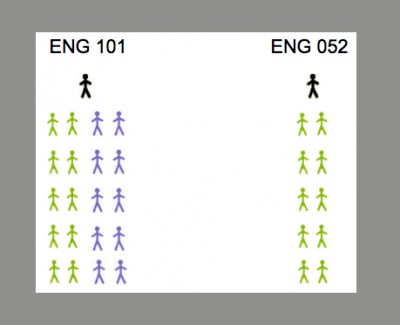The Accelerated Learning Program (ALP) is a form of mainstreaming developed at the Community College Baltimore County. ALP attempts to combine the strongest features of earlier mainstreaming approaches and, thereby, to raise the success rates and lower the attrition rates for students placed in developmental writing.
The table below illustrates the structure of the ALP courses.

Under ALP, students whose placement is in the upper level developmental writing course are invited to register for one of the designated sections of ENG 101. Participation in ALP is completely voluntary, and any student placed in the upper-level writing course, including those who barely made it into the course, is eligible These ALP sections of ENGL 101 have 10 seats reserved for ALP students, shown in green in the table above. The other 10 seats are designated for students whose placement is ENG 101, shown in blue.
As far as we know, ALP is the only mainstreaming program that places basic writers into a section of ENGL 101 along with students whose placement is ENGL 101. We think this is an important feature of our program. We do lots of group work in our writing classes, and we think it works much better in a section with some strong writers than it would in a section of all basic writers. We also think we ameliorate some of the stigmatizing effects when students are placed in a section composed completely of basic writers.
These same ten ALP students also register for a section of the ALP companion course which meets in the class period immediately following the ENGL 101 section. The same instructor teaches both the 101 and the companion course. this section functions more or less as a workshop to provide the support the basic writers need to succeed in ENGL 101.
An important feature of ALP is the relationship that develops among the ten students, who take the two courses together, and also between them and the instructor, who teaches both sections. We think this bonding is a major contribution to the persistence of these students.
The ENGL 101 class is conducted just like a regular 101 class. We consider it essential that we maintain the same standards and cover the same material in the 101 class as we would in any 101 section.
The instructor for the companion course has one goal: to do whatever will maximize the ALP students’ likelihood of success in the 101 class. Typically, what we do in the companion course includes some of the following.:
- answering questions left over from the 101 class
- discussing ideas for the next essay in 101
- reviewing drafts of essays the students are working on for 101
- writing short papers that reinforce what has been discussed in the 101 class or prepare for what will be discussed in the 101 class
- working on grammar and punctuation
- discussing how to succeed as a college student
- discussing problems interfering with the students’ progress in 101
Students pay for six credits for the two courses. The ENG 101 counts as a three-credit course, but they do not receive credit for the companion course; in the state of Maryland, college credit cannot be awarded for developmental courses.
Faculty receive 3 credits on-load assignment for the 101, and they receive credits for the companion course. Faculty have found this class enjoyable because of the small class size and the opportunity to get to know and interact with students. Even more important, most faculty find teaching in ALP to be the most rewarding teaching they have ever done.
